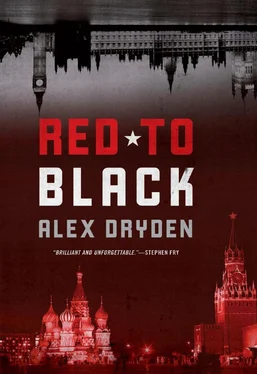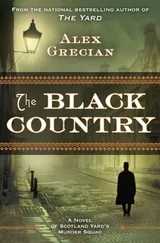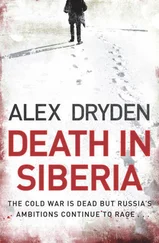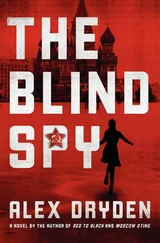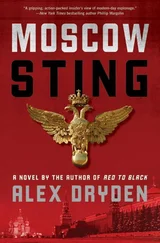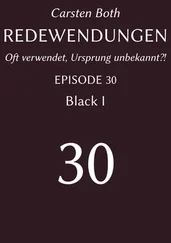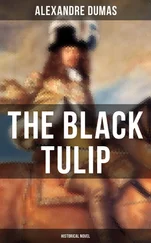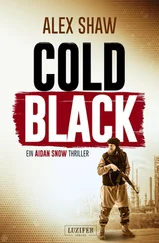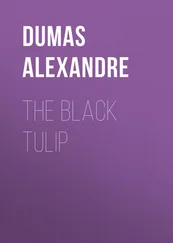‘Are you with me or against me?’
‘Could be either. It depends. I don’t know. That’s up to you, I guess. All I can say is that we’re interested in what you’re doing.’
‘Well?’
‘Someone–not us- wants you to stop your inquiries. They say they’ve gone far enough. Time to back off.’
Finn leaned back on the plastic bench and lifted the coffee to his lips.
‘I wonder who that could be,’ he said sarcastically.
‘You’re being offered ten million dollars to go away,’ Lev said.
Finn slowly put the mug down on the table. He looked in blank astonishment at his old friend. Lev was now casually engaged in stirring another spoon of sugar into his coffee. He still hadn’t removed his hat.
‘You’re kidding, Lev,’ he said. ‘Aren’t you?’
‘Like I said, it could be very helpful to you, I’d have thought,’ he said drily.
‘Who’s offering me that kind of money?’
‘I don’t know.’
‘Come on! For Christ’s sake, Lev.’
‘I tell you, I don’t know. That’s the truth, Finn. I’m just the messenger. Presumably someone up high in Tel Aviv knows, General this or that, I don’t know. The message was parlayed to Tel Aviv from God knows who and I just have the job of passing it on, that’s all.’
‘Ten million dollars.’
‘I don’t know what the exchange rate is, but it seems generous, yes. Unusually generous. Whatever you’re up to from now on, I’d drop it. Take the money. Marry your Russian.’
‘The Russians really are entering the modern world,’ Finn said.
‘It looks like they’re treading carefully, I’d say,’ Lev said. ‘If it is the Russians. But whoever is offering you this kind of money is making you a decent offer. On the one hand you have this little incident in Geneva the Russians are trying to hang around your neck. On the other, you have ten million dollars. It looks like an easy choice to me. I know which one I’d take.’
‘You think so?’ Finn said. ‘If they’re offering me ten million bucks, it looks to me like they’re worried they can’t frame me for Naider’s murder.’
‘I wouldn’t risk it,’ Lev said. ‘Here’s a number where you can get me.’ He handed a card across the table with a name Finn had never heard of printed on it, and a company title underneath. ‘Don’t take too much time deciding,’ Lev says. ‘Apparently they want to know soon.’
‘The Russians?’
‘I repeat, I don’t know. My bosses in Tel Aviv tell me “they”, that’s all. Presumably you know who “they” are. If you know what you’re doing that is,’ Lev added.
‘More coffee?’ Finn said.
‘Yes, why not. It’s delicious,’ Lev replied facetiously, now apparently sunk into a permanently disenchanted alternative world where words had become the opposite of their meaning.
Finn got up and went to the counter and got himself a glass of water and a coffee for Lev. When he returned to the table, Lev leaned across to him.
‘The Russians who’re coming to Israel now,’ he said, ‘they’re buying everything. Some of them are on the run from Putin. Others, it’s hard to say. The ones we’re really interested in are those who we’re sure are just an extension of his siloviki rule. We don’t mind Russians buying things, we just don’t want Russia buying them.’
‘Is that the Kremlin’s policy?’
‘Could be. They have the money now.’
‘Tell me what you know. Tell me about Exodi.’
‘I can’t do that. We’re interested in what you’re doing, that’s all. Take the money, Finn.’
Finn knew he wouldn’t get anything more from Lev.
‘How’s the family?’ he said after leaving Lev’s offer hanging in the air.
‘All fine, thank you. The boys are going to college in America. I’m guessing they probably won’t come back.’
‘You happy about that?’
‘It’s best for them there,’ Lev said.
‘And you?’
‘I will stay in Israel. I don’t know why. Like I say, this new wave of Russians who’ve arrived since Putin came to power are a different bunch compared to us. We came with nothing. They bring billions. Billions. Some of them are making big donations, you wouldn’t believe. Not just to the usual charities. To us, to Mossad.’
Finn laughed. ‘You guys will take money from anyone,’ he said.
‘And you? Will you take the money?’
‘I’ll let you know, Lev.’
Finn takes the train from Frankfurt to Saarbrucken. The flat north German countryside changes to rolling hills of wheat and pasture, tree coppices dotting the tops of the hills with new season’s green.
His mood on this journey takes him to the depths of the sadness that lives inside him, no matter what his outward enthusiasm suggests.
But his sadness comes from the knowledge that it is not beyond his control to stop and to walk away. He has a choice.
I’ve seen him sometimes in the early mornings, when he wakes and hasn’t had time to prepare his mask for the world. I’ve seen the sadness in his eyes, which disappears as soon as he knows he’s being watched. Finn never accepted that this sadness existed, and never addressed its causes. He could not or would not change.
Finn meets Dieter in the same Chinese restaurant where they had met four years before. They order the same inflation-proof twelve-euro menu and two Tiger beers.
Dieter has aged, Finn thinks. The short span in time has added a decade to Dieter’s face and he looks like an old man suddenly. But his eyes are still alert, still searching, calculating.
‘Who are the five individuals, Dieter?’ he asks, referring to the Dresden file. ‘Why them? Why are they being paid? What connects them to Exodi?’
‘I’ll do what I can, Finn. We are near the truth, just as I was fifeen years ago.’
‘Maybe we’ll get a different result this time,’ Finn says.
‘I have something for you too,’ Dieter tells him and leans in across the narrow table. ‘I may have turned up one of the brothers. One of Otto Roth’s long-lost brothers.’
‘Where?’
‘Not at Jensbank, but it may be something more interesting than that. This man is said to be the owner of one of Germany’s biggest trucking firms.’
Finn thinks for a moment and shakes his head.
‘What’s interesting about one of Germany’s biggest trucking firms?’ he asks.
But Finn knows the significance of one of Roth’s brothers owning a company that transports goods across borders.
‘The trucking company was set up in the mid-sixties,’ Dieter continues. ‘It was founded by this man, this brother as I believe. He is a prominent ex-Nazi, and today the company he set up is one of Europe’s largest. It’s a world leader in transportation, in fact, and was originally run by ex-Nazis. Roth’s brother–if it is him–is using a different name now, of course, one unconnected to those times, to the Nazis.
‘In the sixties, when Schmidtke appeared on the scene, this trucking company was helped along the way, shall we say, by the Stasi and the KGB. Otto Roth sorted out the financing and the money movements from East to West, and this brother of Roth’s headed the company. The story is, they began to bring all kinds of contraband across the borders. A great German success story, built on a foundation of Soviet trade.’
‘Are they trading with Russia now?’ Finn asks.
‘It’s not as straightforward as that. In fact, the odd thing is that such a big firm doesn’t go to Russia at all. Some of the fleet make frequent trips to Moldova. But they don’t go to Moldova itself. They continue into the Russian enclave of Transdnestr, inside Moldova, which the Russian 13th Army has refused to leave. They also run trucks in and out of Abkhazia on the Black Sea. Since the civil war there a few years back, Russia’s left troops behind there too. Just like Transdnestr, Abkhazia offers the Kremlin another safe haven for its criminal dealings. This trucking fleet doesn’t go to Russia, but it goes to places where Russia exerts its influence.’
Читать дальше
